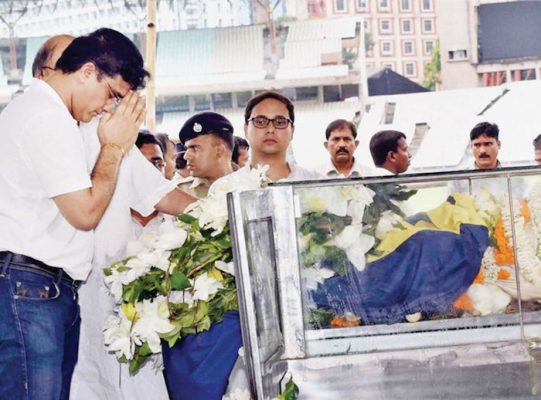KOLKATA (TIP): Board of Control for Cricket in India (BCCI) president Jagmohan Dalmiya, hailed as the architect of India’s rise as the game’s financial superpower, passed away in a private hospital in Kolkata on Sunday. He was 75.
Dalmiya, who had also served as president of the International Cricket Council (1997- 2000), was admitted to hospital after suffering a heart attack on Sept 17.
A businessman known for his marketing acumen, Dalmiya was a key figure in bringing the 1987 and 1996 cricket World Cups to the sub-continent. He took over as BCCI president for a second time earlier this year, after a gap of nearly a decade, but had not been keeping well for the past few months.
A key figure in the BCCI ever since he joined it in 1979, Dalmiya played a major role in helping it to emerge as the wealthiest cricket board in the world, with the lifestyles of India’s leading cricketers being transformed. His stint as the first Asian head of the ICC marked a shift in the game’s balance of power from the old superpowers, England and Australia, towards Asia, particularly India. It was a controversial tenure, but even his detractors acknowledged that he opened their eyes to the game’s revenue-making potential.
BCCI sources said board secretary Anurag Thakur would soon call for a special general body meeting to decide the way forward.
Since Dalmiya was from East Zone, the next president will also have to be a nominee from the same zone before BCCI heads for another election.
The sources said the board could also appoint a consensus candidate, which would be acceptable to all factions. A Union Cabinet minister is expected to play a key role in deciding the next president.
Dalmiya was admitted to the BM Birla Heart Research Centre after suffering a heart attack on Thursday evening. He underwent coronary angiography under Dr Anil Mishra’s supervision and a clot was aspirated out to establish good flow in coronary arteries.
He was kept under observation in the CCU during the last two days and was ‘stable’ as per the medical bulletin issued by the hospital.
On Sunday afternoon, a procedure was done in the afternoon to implant two stents, according to hospital sources. He was brought back to his CCU bed and looked to have taken the procedure in his stride.
In the evening, though, his condition deteriorated. “At 6pm his condition deteriorated and shortly afterwards he suffered a massive cardiac arrest from which he could not recover,” said one of the doctors who was in the team looking after him. “He died of internal gastrointestinal bleeding and internal organ failure.
Even though he had been ailing, the news of his death stunned the city’s cricketing fraternity. The CAB has cancelled the Gandhi-Mandela Lecture, which Dalmiya was supposed to deliver with Ali Bacher on October 7, a day before the India-South Africa T20 International at Eden Gardens.
Chief minister Mamata Banerjee, who went to the hospital to pay her respects, described his death as a huge loss for sports. “He was a giant amongst sports administrators, a true lover of Bengal,” she tweeted.
BCCI secretary Anurag Thakur wrote:
“The greatest sports administrator of India has passed away, an era ends. A personal loss to me and Indian cricket. I knew Dalmiya ji for over 15 years. He was a mentor to us all and a true lover of the game. His guidance and passion was immense.”
Bengal skipper Laxmi Ratan Shukla felt like he had lost a guardian. “It is shocking news for me. I have grown up seeing him and played all my cricket seeing him in charge of things. It is a great loss,” was all that he could say.
Ranadeb Bose, a former Bengal cricketer, was equally shocked. “I can’t believe this… I went to the hospital to meet him at 5.30pm today when a medical examination was going on and I was told he would be fine in 2-3 days… And three hours after that, I hear this!”
Dalmiya’s body will be brought to the CAB around noon on Monday and kept there till 3 pm for people to pay their last respect. His last rites will be performed in the evening.
